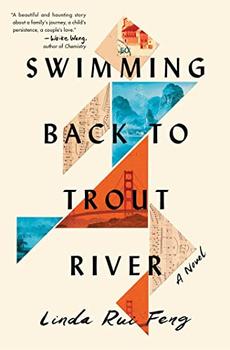Summary | Excerpt | Reviews | Beyond the Book | Readalikes | Genres & Themes | Author Bio

He now recognized his mistake, the design flaw in Junie's wooden horse. He had made it to be slow moving, because he recognized in his granddaughter a monkey-like impatience that had been in his son. But he should have made it noisy too, to signal motion. Now he was racing against the lengthening of the afternoon shadows, and if he lost the race, the night that followed would be interminable.
He pointed his bicycle toward the river. By now he was calling out her name without pause.
Junie hadn't counted on the terrain having so many nooks and crannies that made it harder to propel her wooden horse than on the concrete floor at home. Worse, when she pushed too hard with the wooden poles, one of them snapped, and the remaining piece was too short, so she always ended up veering in the wrong direction.
She made it to the middle of an abandoned field and finally scooted off the wooden horse and sat on the ground. Sweat dripped down her neck, and she muddied herself more every time she took her hand away from the ground to wipe off the sweat.
Junie closed her eyes and imagined herself in the well, with its deliciously cool subterranean water. But it was the river she had to reach, and she wanted to reach it soon, because it seemed like the only hope she had for keeping her world just the way it had been, just the way it should be.
She fought the urge to lay down her head on the ground for a momentary rest.
Clankety-clank.
The rattle of her grandfather's bicycle came to Junie as if in a dream, and startled her awake. She lifted her head off the ground like a woodland animal, and held her breath. Then the call of her name came, across the field between her home and the river, like a growing whisper.
Junie!
She summoned all her strength to answer—I'm here, I'm here—then, screwing shut her eyes, began to cry with a vehemence that surprised even her.
For days afterward, the villagers who lived around that field talked about how wrenching that child's cry was. Mothers instinctively glanced at their children, as if to make sure they were still where they ought to be.
When Grandpa came and snatched Junie up in his arms, it was quite some time before she could make herself understood.
"I don't want to go anywhere," she mumbled between spasms of breath. "I want to stay here with you and Grandma, even when you are old, forever and ever—"
Grandpa started to shake his head when he heard the word "forever," but he saw Junie's fever-red cheeks and stopped himself.
"If you send me away, I'll turn," she told him.
Grandpa stared at her.
"I'll turn into a fish and swim back here," she said, pointing to the direction of the river, "from America!"
"From the river?"
"I'll learn to swim for a long way," Junie said. She'd seen America on a map, and it was across an expanse of textured blue. But what was an ocean, after all, but a bigger body of water? And didn't adults say that all rivers drained into the sea?
"We are just going home right now," Grandpa said finally. "Just going home."
It wasn't the answer Junie wanted, but something of her earlier resolve slackened when she heard him say this.
Grandpa put Junie on the back seat of his bicycle and pushed off. As they rode away, neither Junie nor Grandpa mentioned the wooden horse they left behind in the field. It was as if they agreed that it had outlived its purpose.
Junie rested her hiccuping head against Grandpa's bony back as he pedaled on the bumpy road, wobbling and clanking. Across the thin fabric of his sweat-soaked shirt and against Junie's cheek, his ribs rose and fell with his breathing. She recognized that moment as the beginning and the end of something—though she was too young to say exactly what that something was. But she knew, without really knowing she did, that the gossamer threads we put out into the world turned into filaments, and filaments into tendrils, and that what people called destiny was really the outward contours of billions of these tendrils, as they exerted their tug on each of us.
.
Your guide toexceptional books
BookBrowse seeks out and recommends the best in contemporary fiction and nonfiction—books that not only engage and entertain but also deepen our understanding of ourselves and the world around us.